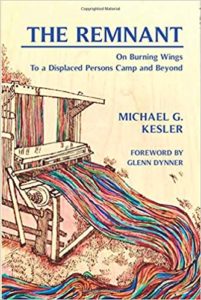The Remnant: On Burning Wings to a Displaced Persons Camp and Beyond by Michael G. Kesler; Valentine Mitchell, 2021; ISBN 9781912-676637; 153 pages including appendices;
By Donald H. Harrison

 SAN DIEGO — In this memoir, nonagenarian Michael G. Kesler tells how as a teenager, he escaped both forced service in the Soviet Army and the Nazi invasion of his Polish home town by hopping trains with his older sister Luba eastward to the Soviet Asian republics where they both found productive work.
SAN DIEGO — In this memoir, nonagenarian Michael G. Kesler tells how as a teenager, he escaped both forced service in the Soviet Army and the Nazi invasion of his Polish home town by hopping trains with his older sister Luba eastward to the Soviet Asian republics where they both found productive work.
In Samarkand, Uzbekistan, Meesha (as he was then nicknamed) tasted first chaste love, but he could not settle down with a lovely non-Jewish Uzbeki girl; he felt he had to return to Dubno, Poland, with Luba and her husband Moniek to determine if his and Luba’s parents had survived. They had not; they were massacred with the other townspeople by the Nazis.
Onward to a Displaced Person’s Camp in Landsberg, Germany, the group went, ironically feeling safer in the heartland of the former Nazi enemy (now that it was under American administration), then they had in Russia, Poland, or Czechoslovakia. There, Kesler trained with Hashomer Hatzair for what he believed would be a future kibbutz life in British Mandatory Palestine. But fate intervened in the form of a B’nai B’rith Hillel scholarship for professional studies in the United States–an award that eventually led to studies at the Massachusetts Institute of Technology (M.I.T.), an American family, and a a career as a respected Ph.D. chemical engineer in the petroleum business.
Amid Kesler’s well-told biographical journey were his reflections on a variety of subjects including contemporary history, Western culture, and, for me, most interestingly, his feelings about God in the wake of the Holocaust.
Moniek was a member of the Bobover Hasidic sect, which teaches that God is ever-present in individuals’ lives, and that whatever may happen to them was part of God’s plan. In a memorable argument, Kesler confronted his brother-in-law: “Did God predetermine the construction of gas chambers and crematoria to exterminate innocent people?” Moniek subscribed to the idea that the Holocaust was a punishment for Jews who had strayed from the Godly path.
Not willing to concede that the Six Million all had strayed or deserved divine punishment, Kesler searched for a better understanding of God. He found satisfaction in the thoughts of a friend, Joseph Gitman, who told him: “God as an idea is the embodiment of perfection — perfection of justice, fairness, compassion, goodness and peace. It’s the ultimate standard of human behavior, in resonance with the harmony of the universe. … You strive for it. You try to make others strive for it. You convince people — all people — to achieve those ultimate standards. And then, and only then, will you be able to avoid the like of Hitler.”
*
Donald H. Harrison is editor of San Diego Jewish World. He may be contacted via donald.harrison@sdjewishworld.com
Both of my parent’s stories are remarkable and miraculous. Their tenacity, determination, sheer stubbornness that they were going to survive is apparent in every choice they have made.
Dad, at 97, is still planning on writing more books.
Our mother passed away almost 50 years ago. Still,her journey from a Russian camp to Harvard Medical school, and Dad’s, from hiding in far Eastern Russia to MIT, has me shaking my head in disbelief. How did they manage, despite all the obstacles and tragedies they encountered? The Remnant tells some of that inspirational story, both in the telling of the story itself, and knowing that the author is 97, blind, and still has the creativity and passion to tell us this. Love you so much Dad, for all you do.
Kudos to you! Yes, we will go on, AM Yisrael Chai!